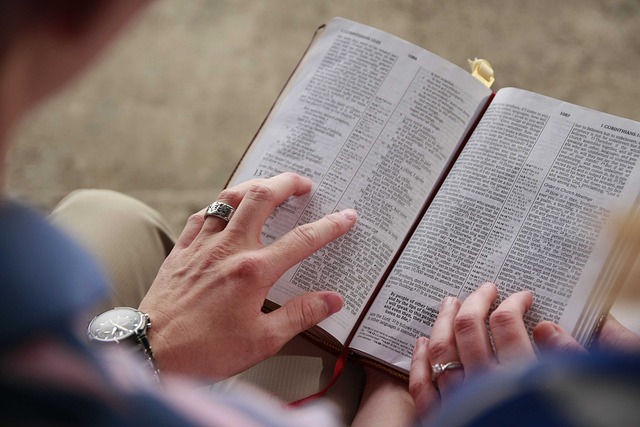The Bible in the Catholic Church is a collection of sacred texts that are considered to be inspired by God and authoritative for faith and practice. It is divided into the Old Testament, which includes writings from before the birth of Jesus, and the New Testament, which includes writings about the life and teachings of Jesus and the early Christian Church. The Bible is considered to be the word of God and is central to Catholic beliefs and teachings.
Table of Contents
History of the Bible in the Catholic Church
The Bible holds a special place in the Catholic Church, serving as the foundation of its teachings and beliefs. But what exactly is the Bible in the context of the Catholic Church? To understand this, we must delve into the history of the Bible in the Catholic Church.
The Bible, which is a collection of sacred texts and scriptures, plays a central role in the Catholic faith. It is divided into two main sections: the Old Testament and the New Testament. The Old Testament contains writings that predate the birth of Jesus Christ, while the New Testament focuses on the life, teachings, death, and resurrection of Jesus.
The history of the Bible in the Catholic Church dates back to the early days of Christianity. The process of compiling the various books and letters that make up the Bible was a gradual one, spanning several centuries. The early Christian communities relied on oral tradition to pass down the teachings of Jesus and the apostles.
As the Christian faith spread, there was a need to preserve and codify these teachings in written form. This led to the compilation of various texts and letters that were eventually recognized as sacred scripture. The process of determining which books would be included in the Bible was not without controversy, with different Christian communities having different canons of scripture.
In the fourth century, the Catholic Church officially recognized the canon of scripture that is still in use today. This canon includes 46 books in the Old Testament and 27 books in the New Testament. These books were deemed to be inspired by God and therefore authoritative for the faith and practice of the Church.
The Bible was originally written in Hebrew, Aramaic, and Greek, and has been translated into numerous languages over the centuries. The Catholic Church has played a key role in the translation and dissemination of the Bible, making it accessible to believers around the world.
Throughout history, the Bible has been a source of inspiration, guidance, and comfort for Catholics. It contains the stories of God’s interactions with humanity, the teachings of Jesus, and the wisdom of the apostles. Catholics are encouraged to read and study the Bible regularly, as it is believed to be a living word that speaks to believers in every age.
The Bible is also used in the liturgy of the Catholic Church, with readings from both the Old and New Testaments included in the Mass and other worship services. These readings are chosen to reflect the themes of the liturgical season and to provide spiritual nourishment for the faithful.
In conclusion, the Bible holds a special place in the Catholic Church as the inspired word of God. Its history in the Church is a testament to the faith and devotion of generations of believers who have cherished and preserved its teachings. The Bible continues to be a source of strength and inspiration for Catholics around the world, guiding them in their journey of faith and discipleship.
Importance of the Bible in Catholic teachings
The Bible holds a special place in the Catholic Church, serving as a foundational text that guides the beliefs and practices of its members. But what exactly is the Bible in the context of the Catholic Church, and why is it so important? Let’s delve into the significance of the Bible in Catholic teachings.
First and foremost, the Bible is considered to be the inspired word of God in the Catholic Church. This means that Catholics believe that the authors of the Bible were guided by the Holy Spirit to convey God’s message to humanity. As such, the Bible is seen as a sacred text that contains timeless truths and teachings that are relevant to believers of all generations.
The Bible is divided into two main sections: the Old Testament and the New Testament. The Old Testament contains the sacred writings of the Jewish people, while the New Testament focuses on the life, teachings, death, and resurrection of Jesus Christ. Together, these two sections form the basis of Catholic doctrine and provide a comprehensive understanding of God’s plan for salvation.
In Catholic teachings, the Bible is not just a historical document or a collection of moral stories. It is a living and dynamic text that continues to speak to believers today. Through the reading and study of the Bible, Catholics seek to deepen their relationship with God, grow in faith, and discern His will for their lives.
The Bible is also central to the liturgical life of the Catholic Church. Scripture readings are an integral part of the Mass, with passages from the Old and New Testaments being proclaimed during the liturgy of the Word. These readings are carefully selected to correspond with the liturgical season and help to illuminate the themes of the Mass.
Furthermore, the Bible serves as a source of inspiration and guidance for Catholics in their daily lives. The stories of faith, courage, and redemption found in the Bible offer comfort and encouragement to believers facing challenges and struggles. By meditating on the words of Scripture, Catholics can find strength and hope to persevere in their faith journey.
The Bible is also a tool for evangelization in the Catholic Church. Catholics are called to share the Good News of Jesus Christ with others, and the Bible provides a solid foundation for proclaiming the message of salvation. By sharing the stories and teachings of the Bible with others, Catholics can help to spread the love and mercy of God to all people.
In conclusion, the Bible plays a vital role in the life of the Catholic Church. It is a sacred text that guides believers in their faith, worship, and mission. By studying and meditating on the words of Scripture, Catholics can deepen their relationship with God, grow in holiness, and share the Good News with others. The Bible is truly a treasure trove of wisdom and grace that continues to inspire and transform the lives of believers around the world.
Different translations of the Bible used in the Catholic Church

The Bible is a central text in the Catholic Church, serving as a guide for faith and practice for millions of believers around the world. But what exactly is the Bible in the context of the Catholic Church? In simple terms, the Bible is a collection of sacred texts that are considered to be inspired by God and authoritative for Christian belief and practice.
One of the unique aspects of the Catholic Church is its use of different translations of the Bible. While the core content of the Bible remains the same across translations, the choice of translation can have a significant impact on how the text is understood and interpreted.
The most commonly used translation of the Bible in the Catholic Church is the New American Bible (NAB). This translation was first published in 1970 and has since been revised several times to reflect changes in language and scholarship. The NAB is known for its clear and accessible language, making it a popular choice for both personal study and liturgical use.
Another popular translation used in the Catholic Church is the Revised Standard Version Catholic Edition (RSV-CE). This translation is based on the King James Version of the Bible and is known for its formal and poetic language. The RSV-CE is often used in academic settings and is favored by those who appreciate a more traditional approach to scripture.
In addition to these two translations, there are many other versions of the Bible that are used in the Catholic Church, each with its own unique features and characteristics. Some translations, such as the Douay-Rheims Bible, are based on older manuscripts and reflect a more traditional approach to scripture. Others, such as the New Jerusalem Bible, are known for their inclusive language and modern scholarship.
The choice of translation can be a personal one, with each individual finding a version of the Bible that speaks to them in a meaningful way. Some may prefer a more formal and traditional translation, while others may appreciate a more contemporary and accessible approach.
Regardless of the translation used, the Bible remains a central text in the Catholic Church, guiding believers in their faith and practice. It is a source of inspiration, comfort, and guidance for millions of people around the world, and its words continue to resonate with believers of all ages.
In conclusion, the Bible in the Catholic Church is a diverse and multifaceted text, with many different translations available to suit the needs and preferences of individual believers. Whether one prefers a more traditional or modern approach to scripture, the Bible remains a central and authoritative text in the life of the Church, guiding believers in their faith and practice.
The role of the Bible in Catholic liturgy and worship
The Bible holds a central place in the Catholic Church, serving as a source of inspiration, guidance, and wisdom for its members. In Catholic liturgy and worship, the Bible plays a crucial role in shaping the beliefs and practices of the faithful. From the readings during Mass to the prayers and hymns that are based on scripture, the Bible is woven into the fabric of Catholic worship in a variety of ways.
One of the key ways in which the Bible is used in Catholic liturgy is through the readings that are proclaimed during Mass. Each Sunday, Catholics gather to hear passages from the Old Testament, the Psalms, the New Testament, and the Gospels. These readings are carefully selected to reflect the themes of the liturgical season and to provide spiritual nourishment for the faithful. The Bible readings are not just words on a page; they are living and active, speaking directly to the hearts of those who hear them.
In addition to the readings, the prayers and hymns that are sung during Mass are often based on scripture. The prayers of the Mass draw on the language and imagery of the Bible, helping to connect the worshipper with the sacred texts that have been passed down through the centuries. Hymns and songs that are sung during Mass also frequently incorporate passages from the Bible, allowing the faithful to express their praise and adoration in words that are inspired by scripture.
The Bible is not just a book that is read and recited during Mass; it is a living word that shapes the beliefs and practices of Catholics in their daily lives. The teachings of the Bible are reflected in the moral and ethical principles that guide the actions of Catholics, helping them to live out their faith in a way that is consistent with the teachings of Jesus Christ. The Bible provides a roadmap for how to live a life of faith, love, and service, offering guidance and wisdom for those who seek to follow in the footsteps of Christ.
The Bible is also a source of comfort and consolation for Catholics in times of trial and difficulty. The stories of faith and perseverance that are found in the Bible serve as a reminder that God is always present, even in the darkest moments of life. The Psalms, in particular, are a source of solace for many Catholics, offering words of praise, thanksgiving, and lament that speak to the full range of human emotions.
In conclusion, the Bible holds a central place in the Catholic Church, shaping the beliefs and practices of the faithful in a variety of ways. From the readings during Mass to the prayers and hymns that are based on scripture, the Bible is woven into the fabric of Catholic worship, providing inspiration, guidance, and wisdom for those who seek to live out their faith in their daily lives. The Bible is not just a book; it is a living word that speaks directly to the hearts of those who hear it, offering comfort, consolation, and hope to all who seek to follow in the footsteps of Christ.
Controversies surrounding the interpretation of the Bible in the Catholic Church
The Bible holds a central place in the Catholic Church, serving as the sacred text that guides the beliefs and practices of its followers. However, the interpretation of the Bible has been a source of controversy within the Church, with different factions offering varying perspectives on how to understand and apply its teachings.
One of the key points of contention is the question of literal versus symbolic interpretation. Some Catholics adhere to a literal reading of the Bible, believing that every word should be taken at face value. This approach can lead to a strict adherence to the text, with little room for interpretation or nuance.
On the other hand, there are those who advocate for a more symbolic interpretation of the Bible, viewing its stories and teachings as allegorical rather than literal. This perspective allows for a more flexible understanding of the text, recognizing that the Bible is a complex and multifaceted work that can be interpreted in different ways.
Another area of controversy is the question of biblical inerrancy. Some Catholics believe that the Bible is without error in all matters, including historical and scientific accuracy. This view holds that the Bible is the inspired word of God and should be taken as infallible in all its teachings.
However, there are others who argue that the Bible is a product of its time and culture, and that it should be understood in light of the historical context in which it was written. This approach allows for a more critical reading of the text, recognizing that the Bible contains elements that may be culturally specific or outdated.
The issue of biblical authority is also a point of contention within the Catholic Church. Some Catholics believe that the Bible is the ultimate authority in matters of faith and practice, superseding all other sources of authority. This view holds that the Bible is the definitive guide for how Catholics should live their lives and make decisions.
On the other hand, there are those who argue that the Bible should be interpreted in light of tradition and the teachings of the Church. This perspective holds that the Bible is an important source of authority, but that it should be understood within the broader context of the Church’s teachings and traditions.
Despite these controversies, the Catholic Church has a long history of grappling with the interpretation of the Bible. Throughout the centuries, theologians, scholars, and clergy have engaged in rigorous debate and discussion about how to understand and apply the teachings of the Bible in a way that is faithful to the Church’s beliefs and practices.
Ultimately, the interpretation of the Bible in the Catholic Church is a complex and multifaceted issue that continues to be the subject of debate and discussion. While there may be differing perspectives on how to understand the Bible, one thing is clear: the Bible remains a central and foundational text for Catholics around the world, guiding their beliefs, practices, and understanding of the faith.
Conclusion
The Bible in the Catholic Church is considered the sacred scripture that contains the inspired word of God. It is divided into the Old Testament and the New Testament, and is used as a guide for faith and practice by Catholics around the world.

